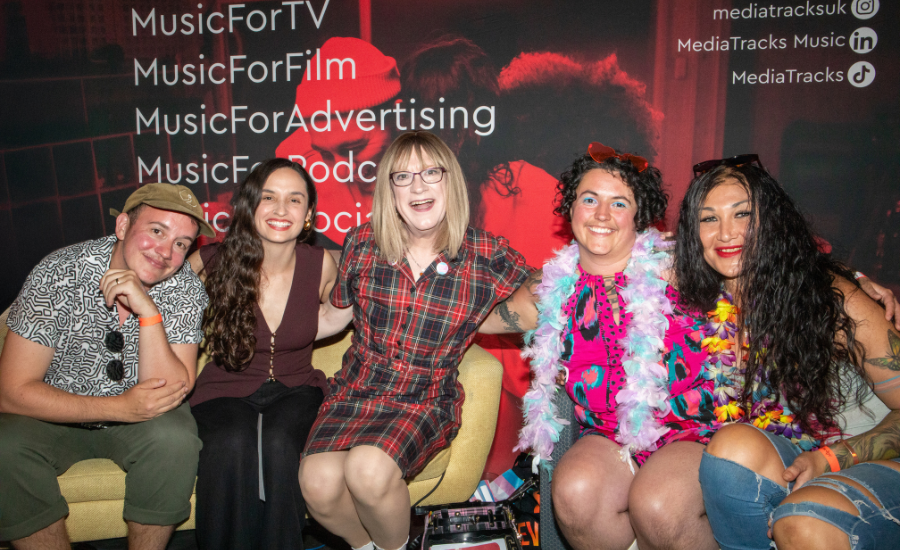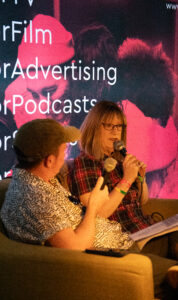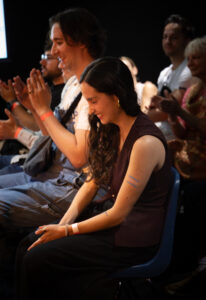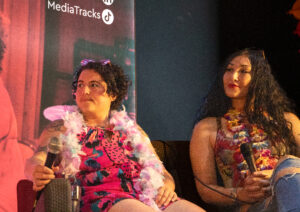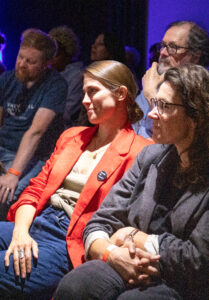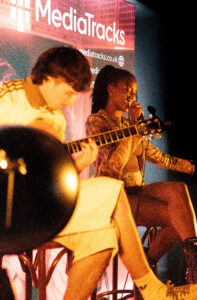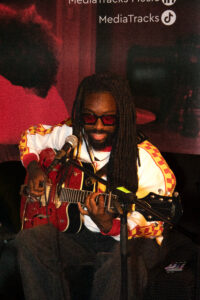Last week we attended MediaTracks (in collaboration with MOBO Unsung and All Is Joy Studios) for their “Pride in Sync” event, sponsored by the British Film Editors Society (BFE) and the UK & European Guild of Music Supervisors.
The event consisted of a panel on Trans + Joy in Music sync, giving us the opportunity to hear about the experiences of the trans community in the music industry, who spoke about the celebration and struggles that they face, as well as sharing stories, coming together, and what commitment to real change looks like for the community and allies alike.
While they made a point of making it clear that they weren’t speaking for all trans and non-binary people, they did an amazing job at giving us first hand insight by recanting their experiences, sharing their points of view, their successes and struggles, and how we can all work together to cultivate joy and safety in the sync industry.
The panel was led by Satch (he/him) songwriter, artist, Co-chair of the Ivors academy, and LGBTQIA+ Advocacy Group. He was joined by, Col Goudie (they/them), a feature film editor and BFE governor for DEI, Isaac Allaway (he/him), music supervisor, and GMS board member, and Saskhia Menendez (she/her) podcast host, advocate, and artist.
They quickly got into the nitty-gritty of the matter and spoke about how more often than not, trans and non-binary people have experiences that leave them in survival mode, which can be not only emotionally exhausting, but affects their personal and professional life. As they articulated it, “Surviving isn’t the same as living. You can’t enjoy your life — or build a meaningful career — when you’re stuck in survival mode”.
They also focused on the importance of joy, how it’s important to celebrate the good, and build up the community. Joy makes a difference in people’s lives, and the panelists spoke on how we can cultivate this joy safely in the sync industry, both as LGBTQIA+ and as allies.
The biggest point is that pride is a state of mind, it’s not confined to a day, a month or once a year – it’s a culture.
So what can we do? Help! The panel provided us with six helpful tips to get involved in our everyday lives, what we can do, and how to spot incidents that we might miss if we’re not looking out.
1. Don’t presume
When it comes to gender identities, you never know what a person’s preferences are, so don’t presume. A quick question asking how they identify is not only polite but very welcome!
2. Step in, call out
There are many times that it’s as easy as intersecting a conversation to make a trans person feel seen and heard. If you hear someone being misgendered, step in, correct them. If you hear an inappropriate comment, call them out, because it’s easier to feel empowered and validated when you know that someone’s on your side.
3. Don’t ask intrusive questions (e.g. surgery, sex, family)
This one seems simple enough, but sadly the panelists shared too many experiences of inappropriate situations, questions, comments and other BS that just shouldn’t happen. The golden rule here is: if you wouldn’t say it to your cis-gender friend, don’t say it to your trans friend!
4. Create inclusive facilities
Everyone wants to feel accepted and comfortable in their everyday life, by having gender neutral facilities, you’re ensuring that there will always be a safe space for the LGBTQIA+ community.
5. Plan events in safe locations
While in the panel, they commented on how the location was kept secret until the last minute to ensure that only the people who needed to know knew. While it might be hard to think about, we live in a world that isn’t always as accepting as it should be, so making sure that we’re taking precautions to keep our LGBTQIA+ community safe is always best.
6. Boost trans/non-binary voices and stories
Make sure that you use your voice to help when and where you can! While some of us hold different levels of privilege, let’s make sure that we use it in a positive way to speak for and amplify the voices of those who might not be able to.
During the panel, Saskhia Mendendez also spoke out about an initiative that she founded called Trans Charter, an initiative dedicated to helping make the music industry safer and more inclusive for trans individuals. If you’re open to exploring partnership opportunities, or joining the movement to support trans and non-binary inclusivity in the music industry, make sure to sign up!
One of the most impactful comments was made by Col who noted that job titles in the industry still held strong attachments to genders, cameraman, soundman, and that can consciously or subconsciously deter members of the LGBTQIA+ community from forming part. Moving away from gendered connotations to create inclusive titles such as producer, editor, is an important but often overlooked part of this discussion.
The biggest takeaway from this event is that pride isn’t just a moment, it’s a movement. While we as the industry have made headway in recent years, it’s a continuous battle that requires commitment and there’s still work to do. By actively listening, learning, and implementing these steps into our everyday lives, we can make sure that the music industry continues to become a truly inclusive and joyful space for everyone.
Happy Pride!
- Photos: Paula Sarmiento
- Photos: Paula Sarmiento
- Photos: Paula Sarmiento
- Photos: Paula Sarmiento
- Photos: Paula Sarmiento
- Photos: Paula Sarmiento
Photos: Paula Sarmiento
